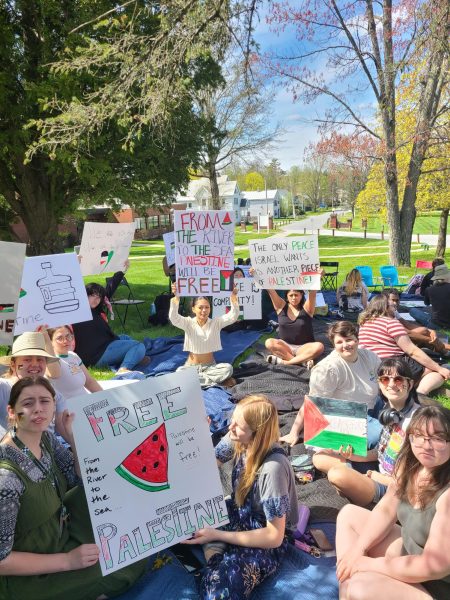Can we please pretend this is normal?
Duck. Dodge. Weave. Let’s keep this civil. Slide. Evade. Lie. Can we pretend this is normal?
For 90 minutes on the evening of Oct. 7, Sen. Kamala Harris and Vice President Mike Pence, two veteran politicians, plied their trade at the first and only vice presidential debate of the 2020 election season. If you blinked, it could almost seem normal.
In jarring contrast to the acrid verbal bloodbath that stood in place of a presidential debate the week before, the candidates often addressed policy and mostly spoke in civil tones. But this front of normalcy was just that, a front.
Perhaps the most tangible sign of the extraordinary circumstances of the evening were the Plexiglas manifestations of distrust standing between the parties. Two see-through barriers, presumably devised to block direct spray of Coronavirus laden spittle from passing between the candidates, sat on the debate stage in an abject reminder of President Donald Trump’s positive Coronavirus test shortly after the first presidential debate. The New York Times reported that the barriers may not have been of any practical use in thwarting the virus, perhaps a fitting metaphor for the evening.
The debate opened with the moderator Susan Page attempting to assert an early and firm grip on the evening’s proceedings. “The two campaigns and the Commission on Presidential Debates have agreed to the ground rules for tonight,” Page said. “I’m here to enforce them on behalf of the millions of Americans who are watching.”
From that point on, Page exerted minimal influence over what the candidates discussed. She asked the questions, and the candidates as often as not used their two minutes to talk about whatever they pleased.
Perhaps the most egregious example of this came when Page asked Pence how his administration would protect people with pre-existing conditions, something that Pence had previously said the Trump administration had a plan for.
“Tell us, specifically, how would your administration protect Americans with pre-existing conditions to have access to affordable insurance if the Affordable Care Act is struck down?” Page asked.
In response, Pence touted his pro-life stance and asked Harris whether a Joe Biden administration would pack the Supreme Court. Apparently, there were more important things to talk about than pre-existing conditions. But still, it must be noted Harris never answered his question, either. But really, this behavior was what was normal about the debate. Politicians sparring and deftly reworking their prepackaged talking points to fit any question is what the oft-referenced “American people” came to expect in the years prior to 2016. However, even this infuriating normalcy was hiding the extraordinary.
Sen. Harris made history as the first woman of color to walk a vice presidential debate stage. A manifestation of potential for vast demographics that have been largely left out of the American political system.
Yet, Harris represented Biden much as any vice-presidential candidate would. She promoted the man and his policies and deflected any questions she felt would go better unanswered.
At the same time, Vice President Pence, with his implacable midwestern calm and oh-so-smooth demeanor, showed absolutely no light between himself and President Trump. He presented a calm Christian grandpa version of the exact same madcap agenda prosecuted by the president at the debate a week before.
When asked what he would do if Trump loses the election and refuses to give up power, Pence suggested that mail-in voting would open a “massive opportunity for voter fraud,” and said he was confident Trump would win if the election is free and fair.
Though not as blatant as Trump’s own refusal to commit to an orderly transfer of power, this was the same “if we win, the election is fair, and if we lose, it must be rigged” rhetoric Trump has been promoting.
When Harris brought up Trump’s refusal to condemn white supremacy, Pence said that the administration had disavowed it many times, yet he did not take the chance to do so himself.
The debate was nearly civilized, if you set aside the numerous outright lies and blatant disregard for basic democratic norms, mostly emanating from one side of the stage.
Nearly, that is, because the interruptions and cross-talking that so characterized the first debate made an appearance here, too. Both Harris and Pence routinely overran the moderator, taking far more time than was originally allotted them.
For much of the debate, the candidates seemed to be tiptoeing around one another in an obvious attempt to avoid spectacle. However, at the first hint of interruption from Pence, Harris delivered a line that will surely make its way onto t-shirts for future campaigns. “Mr. Vice president,” she said, “I’m speaking.”
The two campaigns put forward significantly divergent visions of the future and the past, t times irreconcilably so. The ideal of truth was something that Pence intoned on multiple occasions.
“You’re entitled to your own opinion, but you’re not entitled to your own facts,” Pence told Harris. Strange that these words should come from the second in line in an administration that coined the term “alternative facts,” but a noble ideal non the less.
It’s often tempting to say that people today are living in different worlds. But in reality, we all do live on the same planet, there often is an objective truth, and we are going to have to find some way to move forward.



